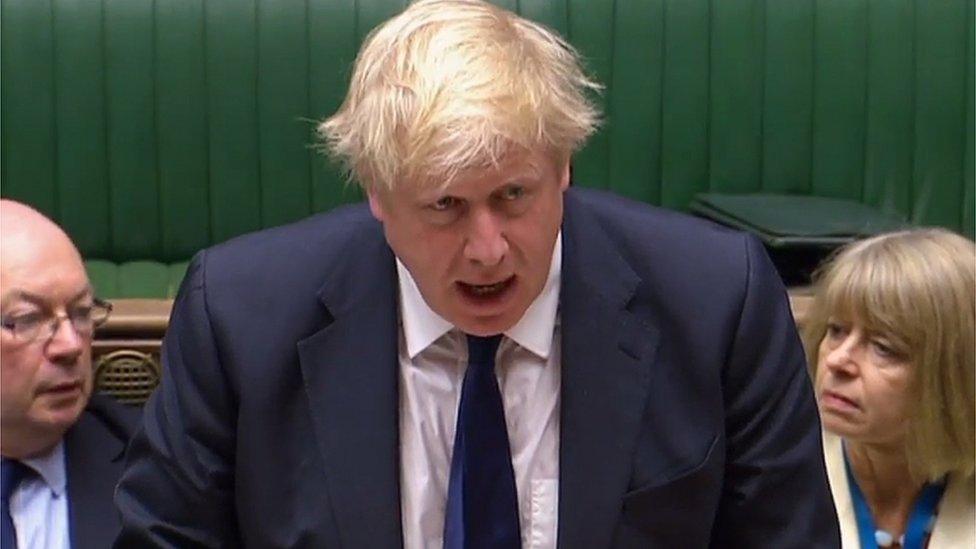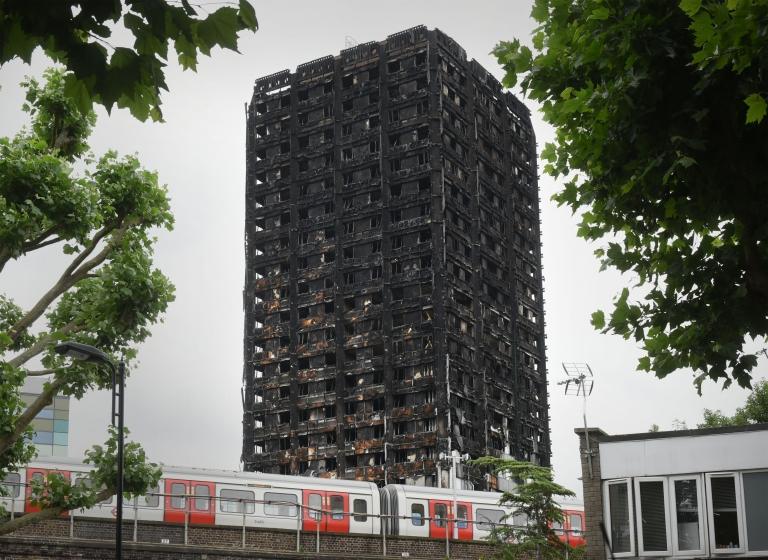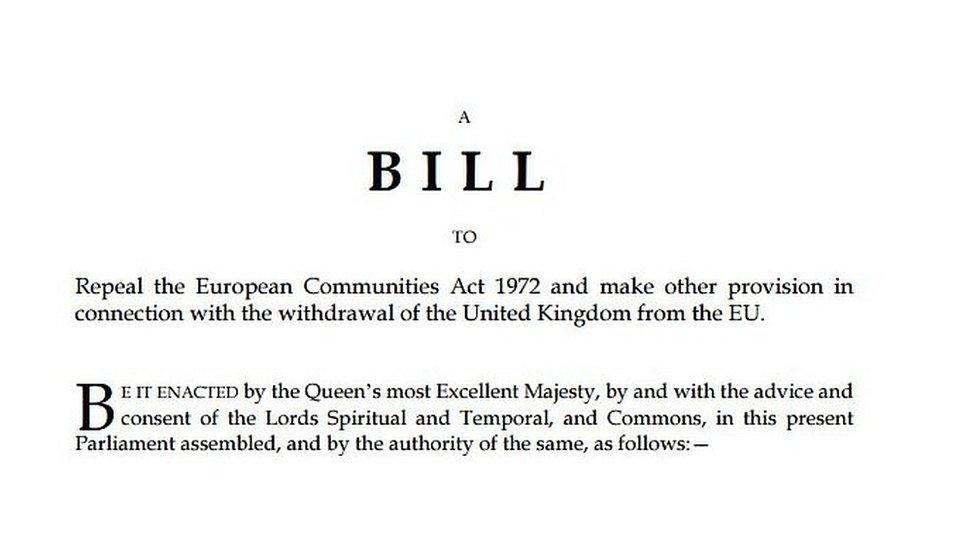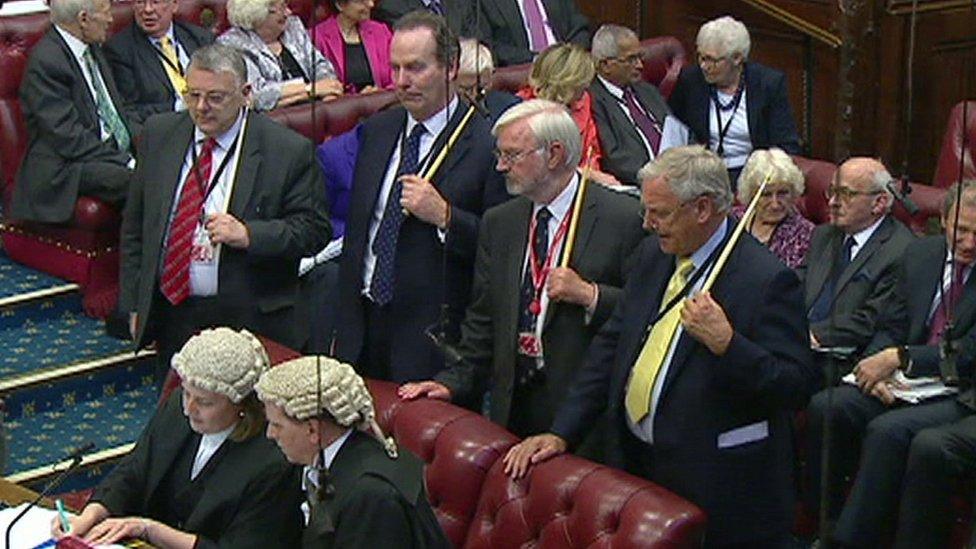What's on in Parliament?
- Published
- comments

Boris Johnson will be taking questions from MPs on Tuesday...will the subject of the customs union come up?
They think it's all over on the EU Withdrawal Bill in the Lords, but it isn't quite.
This Wednesday sees the third reading debate and to almost no-one's surprise there are amendments down for debate, including one backed by the savants and superlawyers of the Lords Constitution Committee on the status of retained EU law.
But once those last rites are completed, there will be a bit of a Brexit hiatus in Westminster, with the prospect that the Withdrawal Bill will be parked in some legislative holding bay, alongside the Trade Bill, waiting for some kind of consensus to emerge around Britain's future customs arrangements and other Brexit issues.
Elsewhere, there is a relatively quiet-looking Commons agenda - although it can and probably will be pepped up by ministerial statements and urgent questions.
There's not a lot of Brexit about, but with both Boris Johnson and the International Trade Secretary Liam Fox due to take questions at the dispatch box, there will be plenty of opportunity to probe the government's open split on future customs arrangements with the EU.
And meanwhile, the trend towards activist select committees seeking to exert leverage on policy issues continues: watch Robert Halfon's Education Committee, this week.
Here's my rundown of the week ahead...
Monday
The Commons opens (2.30pm) with an hour of Education questions - and then expect the usual Monday crop of urgent questions and government statements from 3.30pm.
The day's main legislating is on the second reading of the Haulage Permits and Trailer Registration Bill, external - a fairly uncontroversial contingency Brexit measure designed to ensure that freight keeps rolling along our roads, in the absence of a deal on freight and trailer licensing with the EU.

In Westminster Hall at 4.30 pm, MPs debate e-petition 206722, external relating to the Grenfell Tower Inquiry: "Bereaved families & survivors call on PM to exercise her powers under the Inquiries Act 2005 to appoint additional panel members with decision making power to sit alongside the Chair in the Grenfell Tower Inquiry, to ensure those affected have confidence in and are willing to fully participate in the Inquiry." This attracted 156,582 signatures.
In response, the government underlined its commitment to making sure that survivors, bereaved families and the wider Grenfell community receive all the support they need, adding that the independent public inquiry into the fire is an important part of the process and will help those affected get the answers.
But it added that the prime minister's view was that the inquiry panel had the necessary expertise to undertake the inquiry as it is currently constituted, and that the inquiry needs to produce an initial report as soon as possible, so additional panel members should not be appointed at this stage.
The scheduling of the debate may now have had the desired effect - as I write the government has announced an extra member of the inquiry panel. I don't know what effect this will have on the debate.
My committee pick is the latest Housing, Communities and Local Government hearing on the planning guidance on fracking (4pm) with witnesses from Mineral Planning Authorities and regulatory bodies - questioning is expected to focus on whether existing guidance is adequate and whether fracking should be dealt with as national infrastructure question, under the 2008 Planning Act.
In the Lords (2.30pm) the usual half hour of questions will be followed by consideration of Commons amendments to the Data Protection Bill, external, where the key issues include what may be another attempt to trigger a Leveson 2 inquiry, as well as better use of NHS data, and allowing class actions against data breaches. Will peers ping any of these issues back to the Commons and ask MPs to think again?
The day ends with a short debate on investing in nursing globally to improve health, promote gender equality and strengthen local economies.
Tuesday
The Commons opens (11.30am) for Foreign Office questions - and then the Conservative Craig Mackinlay has a Ten Minute Rule Bill to give Gibraltar an MP to represent it in the Commons.
He will argue that Gibraltar will lose representation when the UK's MEPs disappear on Brexit day and that, despite its modest population, it should have a voice in Parliament. He points out that there are constituencies with very small populations, so there is a precedent.
The main legislating is on the second reading of the Rating (Property in Common Occupation) and Council Tax (Empty Dwellings) Bill, external - this deals with a number of technical points in the rates system and gives local councils powers to increase the council tax payable on long-term empty dwellings.
Then comes a rescheduled general debate on housing and homes - which will provide an interesting test for the new Housing Minister, Dominic Raab, freshly installed in one of the most intricate and sensitive policy briefs in the government. He will be pitted against Labour's John Healey, a long standing expert on housing policy.
The adjournment debate, led by the Conservative Huw Merriman, is on the contribution of demigod manager Arsene Wenger to the profile and performance of English football - will he focus on the glories of the past or the more recent decline and fall?
In Westminster Hall, debates include raising standards of infection prevention and control in the NHS (9.30am) and the diagnosis and treatment of ADHD (4pm).
The debate on public legal education (2.30 pm) is led by the Conservative Ranil Jayawardena who wants to equip as many people as possible with basic knowledge about the legal system, their legal responsibilities, and their rights.
Public legal education (PLE) he says, would help people recognise when they may need support, and the advice available, . He says too many people end up in court with legal problems that could have been avoided if only they knew a little more.
"This isn't about the creation of an army of barrack room lawyers, but instead is part of what should be a concerted effort to spread understanding of the importance of the Rule of Law as widely as possible," he says.

My eye was caught by the 4.30pm debate led by the former minister Sir Henry Bellingham on historic allegations against veterans. He says it is appalling that former soldiers are "being hounded like common criminals" over allegations dating back 50 years, and he will use the debate to highlight his disappointment that the government have ruled out bringing in some form of statute of limitations.
Given the level of backbench concern on this, the minister responding could be in for an uncomfortable time.
On the committee corridor, the Education Committee is holding a hearing on the quality of apprenticeships and skills training - one of the keynote concerns of its chair Robert Halfon, a Conservative former skills minister (9.45am); while the Digital, Culture Media and Sport Committee continues its fascinating Fake News inquiry (10.30am) with witnesses from the Electoral Commission. (Incidentally, keep an eye out for points of order in the Chamber, over its summons to two reluctant witnesses, Dominic Cummings of the official Leave campaign at the Brexit referendum, and Alexander Nix of Cambridge Analytica.)
Another important moment will be the Home Secretary Sajid Javid's debut before the Home Affairs Committee (3.45pm) to give evidence on Windrush.
He will doubtless be mindful that it was her evidence to this committee, just weeks ago, that did for his predecessor, Amber Rudd.
In the Lords at 2.30pm, peers consider the detail of the Smart Meters Bill, external, where there are report stage amendments. This is followed by the final committee day of the Civil Liability Bill - where there are major amendments on some highly technical issues around the personal injury discount rate, which could have a major impact on the NHS - and the payments it makes where people sue for medical negligence.
Wednesday
MPs gather at 11.30am to question the Chancellor of the Duchy of Lancaster and Minister for the Cabinet Office. Prime Minister's Questions follows at noon.
The Labour MP Ged Killen has a Ten Minute Rule Bill, the Banking (Cash Machine Charges and Financial Inclusion) which would require banks to enable free cash withdrawals from current ATMs, as well as requiring the Financial Conduct Authority to supervise an access to banking standard, complete with penalties for breaches.
The main debate is on a Labour motion, to be announced.
In Westminster Hall, there are debates on the 70th anniversary of the NHS and public health (9.30am) and access to reproductive rights around the world (11am).
In the afternoon, Labour MP Ruth Cadbury has a debate (2.30 pm) on housing access to legal aid, to push Labour's policy announcement from April, to reverse restrictions to legal advice for housing cases that resulted from the Conservatives' 2013 cuts to legal aid. The move could help up to 50,000 households per year.
At 4pm the Chair of the Women and Equalities Committee, the Conservative former cabinet minister, Maria Miller, calls on the government to support legal protections against sexual harassment in the workplace across the world. She will argue that the #MeToo campaign had strength because it focussed on something that blights the lives of women internationally.
And at 4.30pm, Labour's Owen Smith and the DUP Westminster Leader Nigel Dodds join forces to press for the mandatory fortification of flour with folic acid to prevent spina bifida and anencephaly. They will argue that the international experience is that there is no downside to this policy and it will bring a sharp reduction in those conditions.
On the committee corridor, in what may prove to be the week's biggest Brexit event, the European Scrutiny Committee has a hearing with the Northern Ireland Secretary, Karen Bradley (10.45am), where the issue of customs and a possible "hard border" looks certain to come up.
Meanwhile the Joint Committee on Human Rights (3.15pm) has a hearing on the detention of Windrush children, with immigration officials.

In the Lords (3pm) the main event is the third reading of the much-amended European Union (Withdrawal) Bill., external The key issues will include environmental protections, public health and a Constitution Committee amendment.
This is followed by a 90 minute debate led by the Labour peer, Lord Kennedy, on alleviating the workload of social workers
Thursday
The Commons opens (9.30am) with half an hour of International Trade questions, followed by Women and Equalities questions, and then by the weekly Business Questions to the Leader of the House, Andrea Leadsom.
She can expect further pressure on the issue of the government failing to provide Money Resolutions, an essential procedural requirement for private members' bills, after enduring a torrid urgent question in the Commons this week.

When will the Commons have a chance to consider Lords amendments to the EU Withdrawal Bill?
MPs will also be keen to see a date for the report stage of the Trade Bill and the consideration of Lords amendments to the EU Withdrawal Bill - but may not be holding their breath.
Then come two backbench debate; first Mary Creagh, the chair of the Environmental Audit Committee, leads a debate on coffee cups, external and plastic bottles, external, following her committee's reports on those items. Then Labour's Peter Kyle leads a debate to mark the international day against homophobia and transphobia.
In Westminster Hall (1.30pm) there are debates on two select committee reports: the Housing, Communities and Local Government Committee's on the effectiveness of local authority overview and scrutiny committees, and (from 3pm) the Joint Committee on Human Rights' on Freedom of Speech in universities.
In a quiet-looking day in the Lords (11 am), the main event is the final day of committee stage debate the detail of the Automated and Electric Vehicles Bill, external, where the issues considered include electric vehicles and charging points.